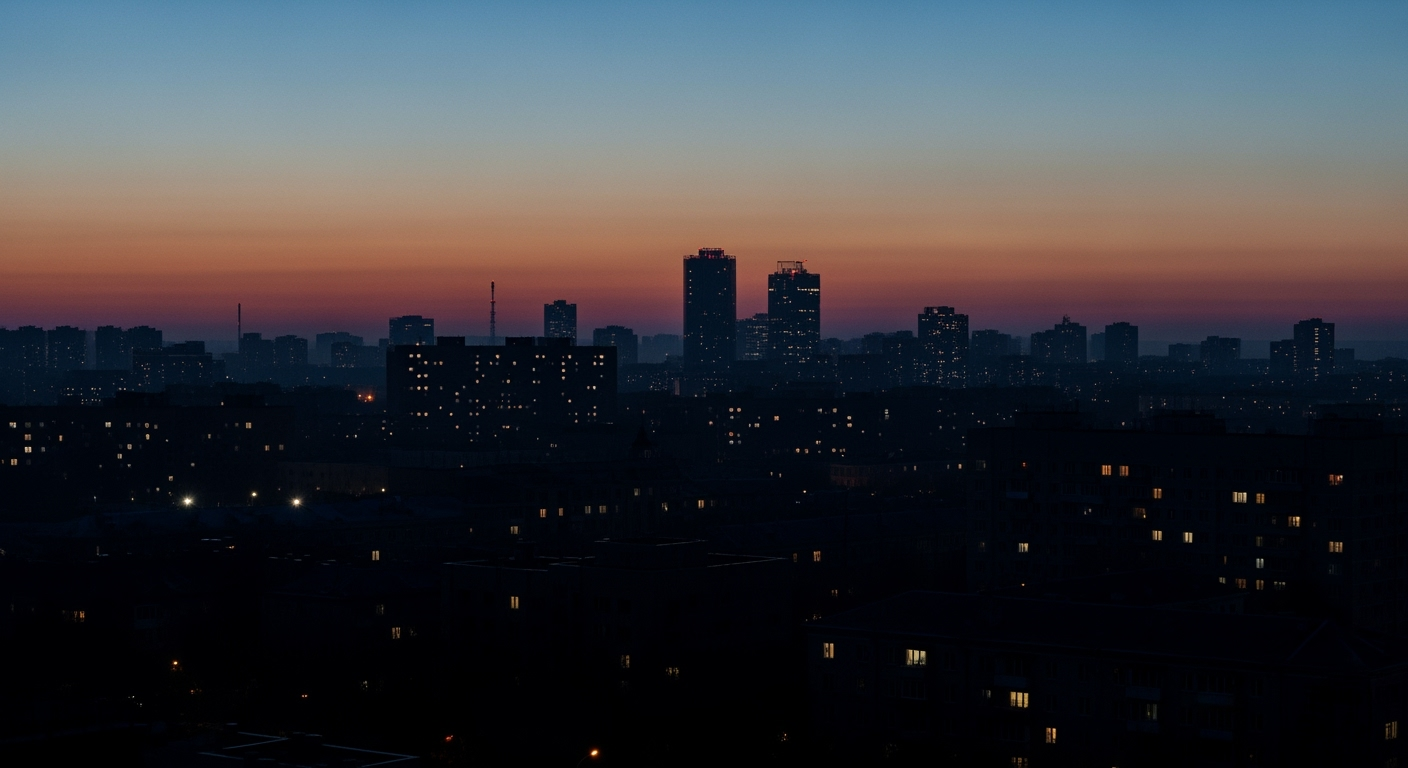Related Articles

Vilnius Airport Grounded as Mysterious Balloons Prompt Overnight Closure

Trump-Putin Summit Delayed Amid Deep Rifts Over Ukraine Peace Terms





KYIV, Ukraine – As autumn temperatures drop, Russia has dramatically escalated its missile and drone attacks on Ukraine's energy infrastructure, systematically targeting power plants and distribution networks across the country. These renewed bombardments are inflicting widespread blackouts, crippling essential services, and forcing millions of Ukrainians to brace for another brutal winter without reliable power, heating, or water. The intensification of strikes has drawn sharp international condemnation, with accusations that Moscow is deliberately weaponizing winter to inflict maximum civilian suffering.
The latest wave of assaults, particularly devastating in northern regions like Chernihiv and Sumy, has severed electricity to hundreds of thousands, underscoring a strategic shift by Russia to undermine Ukraine's civilian resilience. Ukrainian officials report that the deliberate nature of these attacks, often involving waves of Shahed-type drones and ballistic missiles, aims to overwhelm air defenses and prolong humanitarian crises by hindering urgent repair efforts.
Russian forces have intensified their campaign against Ukraine's energy system throughout October 2025, mirroring and in some aspects exceeding the destructive patterns observed in previous years. Recent attacks have particularly crippled infrastructure in the northern Chernihiv and Sumy regions, resulting in complete blackouts and severe disruptions to water supply. In Chernihiv, a "massive attack" on Tuesday left thousands without power, with the regional capital and northern areas experiencing total electricity loss. (4, 8, 12) Kharkiv, an eastern hub, also faced targeted strikes on combined heat and power plants, causing partial outages. (3)
Ukrainian officials assert that Russia's strategy is clear: to "weaponize winter" by destroying critical energy assets ahead of the cold season. (4, 8) Ukrainian Foreign Minister Andrii Sybiha highlighted the brutality of the recent missile and drone attacks, noting that many communities were left without electricity and water amidst cold autumn temperatures. (21) While Moscow consistently maintains it targets only military sites, the observed impact overwhelmingly affects civilian infrastructure, raising serious questions under international humanitarian law. (4, 15) Reports by UN human rights monitors and the UN's Independent International Commission of Inquiry on Ukraine suggest that such systematic targeting, especially during winter, could constitute war crimes and crimes against humanity due to a "disregard for civilian harm and suffering." (2, 15)
The scale of the current offensive is significant. A major attack in early October alone caused power cuts for over one million consumers across multiple regions. (2) Furthermore, previous attacks in 2024 had already severely compromised Ukraine's power generation capacity, reducing it from 18 gigawatts to approximately 12-13 gigawatts. (18) The sustained nature of these strikes, often involving dozens or even hundreds of drones and missiles in a single barrage, aims to exhaust Ukraine's air defense capabilities and cause cumulative damage that extends far beyond individual facility impacts. (6, 15)
The deliberate targeting of Ukraine's energy grid has immediate and devastating consequences for the civilian population. Rolling power cuts implemented across many areas following recent strikes disrupt essential services, including heating, lighting, and electronic communications. (2) Water supply systems, heavily dependent on electric pumping stations, experience significant disruptions, forcing communities to rely on emergency distribution networks and stored supplies. (2, 3, 8) Hospitals, crucial lifelines in a war-torn country, are forced to operate on costly generators to keep patients alive, as exemplified by the northern town of Shostka following a recent strike that cut power, water, and gas. (11)
The humanitarian toll is profound, especially for vulnerable populations. The elderly, individuals with disabilities, and the 3.6 million internally displaced people within Ukraine are particularly susceptible to the dangers of extended power outages during sub-zero conditions. (18, 20, 22) The World Health Organization's Europe director has previously emphasized that "cold weather can kill," highlighting that continued attacks on health and energy infrastructure leave hundreds of facilities lacking fuel, water, and electricity. (22) Parents of oxygen-dependent patients, for instance, face agonizing choices and dire consequences when power cuts render essential medical equipment useless for hours. (22)
Beyond immediate survival, the blackouts have broader societal impacts. Education is severely hampered, with nearly one million children relying on online schooling. Power outages disrupt their access to classes, further isolating them and worsening the psychological impact of the ongoing conflict. (23) The economic implications are also severe, with the energy crisis posing challenges for businesses and threatening the nation's financial stability. (18)
In the face of relentless assaults, Ukraine's energy sector workers demonstrate extraordinary resilience. Emergency response protocols have proven effective in protecting worker safety, such as the successful evacuation of 192 miners during a recent assault on a colliery in the Dnipropetrovsk region. (2) However, repair efforts are severely hampered by the very nature of the ongoing attacks. Ukrainian energy ministry officials report that emergency crews are often unable to begin work on restoring power due to continuous drone attacks, with Russia allegedly circling drones over damaged sites to "deliberately prolong the humanitarian crisis." (4, 8, 12, 21) This tactic exacerbates the suffering and significantly delays recovery.
Despite these challenges, Ukraine has implemented various defensive strategies to protect critical energy infrastructure, including rapid repair capabilities for damaged transmission systems, distributed generation systems for backup power, and developing underground infrastructure to reduce vulnerability. (2) Kyiv has allocated substantial funds, 2.7 billion hryvnias, for infrastructure protection and established a Center for Coordination of Engineering Protection. (9)
The international community has responded with condemnation and increased aid. The European Union has pledged to increase gas supplies to Ukraine and has called for additional measures to support Ukraine's energy security, recognizing the attacks as a "European problem" that extends beyond Ukraine's borders. (2, 6, 9) The United Kingdom has strongly condemned Russia's actions, calling on Moscow to respect international law. (15) International monitoring organizations are actively documenting these infrastructure attacks as potential violations of legal frameworks governing armed conflict. (2)
In a rare instance of cooperation amid the conflict, repairs are underway to restore power lines to the Zaporizhzhia Nuclear Power Plant, Europe's largest. The UN's nuclear watchdog, the International Atomic Energy Agency (IAEA), facilitated local ceasefire zones to allow these critical repairs to proceed after the plant experienced its longest external power outage since the full-scale invasion. (16, 17, 19) This cooperation underscores the universal concern for nuclear safety, even as broader civilian infrastructure faces relentless assault.
As Ukraine braces for the onset of winter, the cumulative damage to its energy system presents an formidable challenge. The systematic campaign against energy infrastructure has created a dire situation where daily power cuts are anticipated, potentially leaving civilians without electricity for extended periods during freezing months. (20, 23) Analysts warn that the energy crisis could trigger further population movements, as some areas become uninhabitable due to heating limitations. (18)
The long-term implications for Ukraine's energy security are profound. Repairing and restoring the damaged infrastructure will require years and significant resources. (20) Even with international support and Ukraine's own substantial efforts, the country faces an uphill battle to rebuild a resilient and secure energy grid while simultaneously defending against ongoing aggression. The impending winter will not only test the physical infrastructure but also the enduring spirit of the Ukrainian people, who are once again confronted with the prospect of enduring cold and darkness as a weapon of war.
The world watches as Ukraine confronts this renewed assault on its civilian lifeblood, demonstrating remarkable fortitude while simultaneously calling for urgent international assistance to bolster its defenses and restore its fundamental services. The systematic nature of these attacks highlights a brutal dimension of modern conflict, where essential utilities become primary targets in a bid to break a nation's will.